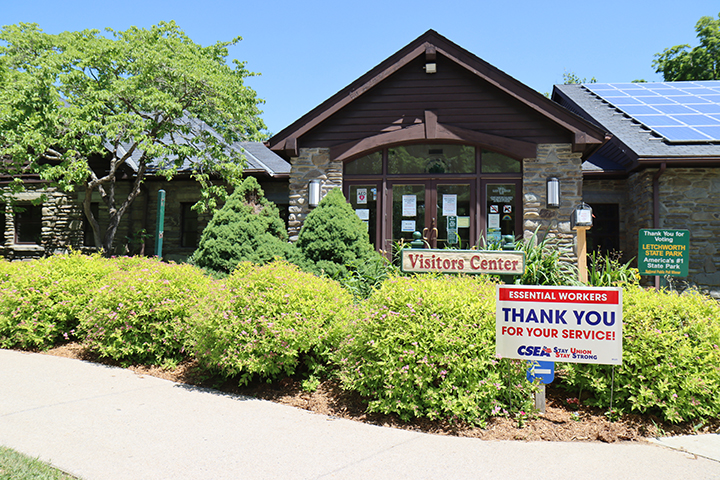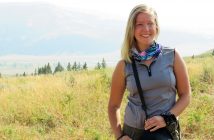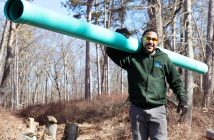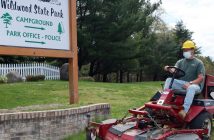At least one part of our state didn’t pause as New York battled the worst of COVID-19.
In the midst of the pandemic, our public parks were an oasis for those seeking an escape from quarantine.
New Yorkers showed that public parks are essential to the quality of life in our state, coming out in droves in search of the open spaces, hiking trails and beaches for which our parks are known.
“Our parks have been open since all of this started and they’ve never really closed,” said Palisades Parks Local President Phil Fayol. “We’ve been full every day. People have wanted, more than ever, to go out and be in nature.”
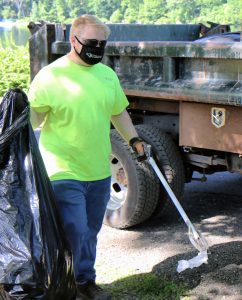
Richard O’Brien, a park worker 3, cleans the grounds in the picnic area next to Hessian Lake at Bear Mountain State Park.
Bear Mountain State Park is one of many in the Hudson Valley region that has quickly filled to capacity on days with good weather. Even with some of the park’s main attractions temporarily closed, including a small zoo and merry-go-round, visitors were picnicking in huge numbers.
In June, workers started ramping up preparation at campsites in the adjacent Harriman State Park and welcomed swimmers at Lake Welch Beach. While an opening date for the pool at Bear Mountain was not available as this edition went to press, Fayol said he expects high demand for Lake Welch.
Long Island Inter-County State Park Local President John Martinez said that because state parks have remained open throughout the pandemic, our members continued to provide vital services.
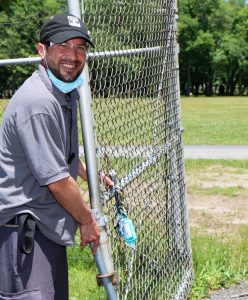
Long Island Inter-County State Park Local President John Martinez maintains a fence.
“It is significant that our work is giving the public a place to go,” Martinez said. “Even if it is something as simple as going for a walk or a jog, they have an option. You can see that it’s appreciated.”
Key role in COVID testing
At Jones Beach State Park on Long Island, CSEA members are balancing providing recreational services with supporting a COVID-19 testing site. Our members helped set up the site, including building a separate, private road for the testing.
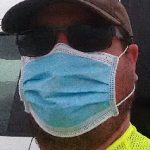
Conklin
“We set up the traffic barrels, barricades, sandbags, guardrails, basically anything that needs to be set up,” said Long Island Inter-County State Park Local member Michael Conklin, a parks worker 3. “Everyone has really come together; you get to see the best sides of who people are during a crisis. It was really hectic in the beginning. There were 500 to 1,000 tests here per day. We were working 12-16 hours per day. Now, we’re down to 8-hour shifts with 200 COVID tests a day, tops.”
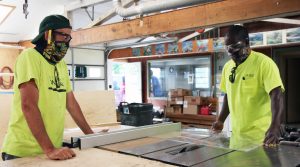
CSEA members Walter Willis, left, a trades generalist, and Greg Williams, a trades specialist carpenter, work
in the carpentry shop at Bear Mountain State Park to create Plexiglas shields to safeguard workers in parking lot toll booths, offices, gift shops and other locations.
In-house labor improves safety
To comply with the state’s new safety protocols, Parks workers have been busy with many new safety features, including building Plexiglas shields at information centers, removing higher-risk sports equipment to encourage social distancing, placing new sanitizing stations throughout the parks and renovating facilities to minimize human contact.
CSEA members used their own skills and talent to complete these new tasks completely in-house, saving the state money.
At Letchworth State Park in Livingston County, CSEA members spent the spring on such safety measures.

Bennett
“This spring was extraordinarily busy for park employees at Letchworth,” said Parks and Recreation Aide Marshall Bennett. “We have a very skilled workforce and we are well prepared. With all the new health requirements and safety protocols, we retrofitted and updated plumbing, electrical and structural equipment to gear up for the warmer months and bigger crowds. We wanted to make sure everyone stays safe and has a wonderful experience here at the park.”
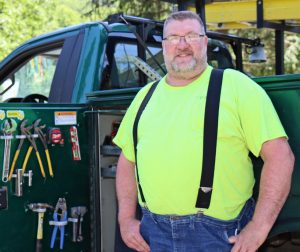
CSEA Genesee Parks Local President Brian Arnold, shown here on the job, is proud of our members’ dedication to state parks.
CSEA Genesee Parks Local President Brian Arnold, an electrician, said our members worked very hard at making restroom facilities hands-free to make them safer, as well as more routine repairs, maintenance and planting.
“I couldn’t be prouder of the way our members have stepped up to the challenge at all our work locations,” said Arnold. “We had to adapt and approach our jobs differently because of the health care crisis, but I must say we managed it very well. Our parks are sparkling clean and in great shape. Visitors are being treated to some of the best recreational services anywhere in the country.”
CSEA members are also well up to the task at Verona Beach State Park.
“For what we do, it’s everything (to the parks),” said Sean Barker, who works in Capital Facilities. “These buildings would be falling down over the last 30 years without our crew.”
Barker is concerned that in the future there might be a lack of interest in work like he does because of generational changes and low pay.
“There’s no one here to replace us. We’ve been here for 28 years knocking it out of the park and carrying the load of what’s got to get done,” Barker said. “We’re a dying art and there’s no computer or machine that can come in and do any of this stuff, whether it’s hanging a steel door or rehabbing an old garage into a sign shop.”
At Palisades, workers have been maintaining the vehicle fleet and catching up on refurbishments on buildings. Fayol, a painter, and his co-workers have completed work at the Bear Mountain Bookstore and Beaver Pond Campground, among other tasks.
Another safety measure that has been more challenging is limiting attendance at the parks.
Fayol said the extraordinarily high turnout before what’s traditionally considered peak attendance season has required workers to be extra vigilant about safety. Traffic control and encouraging social distancing amongst park patrons has fallen largely to our members, some of whom are newer to the job.
“The parks have been packed like a busy July weekend for the past three months,” Martinez said. “It’s really taking a toll on workers physically and emotionally.”
Yet workers are adapting.
“The overall message here is that our CSEA park employees adapt to whatever comes our way,” said Arnold. Our visitors have been great, too. Almost everyone obeys the new mask and distancing rules, and everyone seems to be having a great time.”
Pride is intact
Many Parks workers not only take pride in their role in keeping our state parks pristine, but in their role during the pandemic.
“While I was driving and seeing signs on the roads that said, ‘stay home and save a life,’ I was on my way to work,” Martinez said. “We are really taking pride in the service that we have provided through the pandemic. The parks being open gave people an option of something they could do, even if it was just tailgating in the parking lot.”
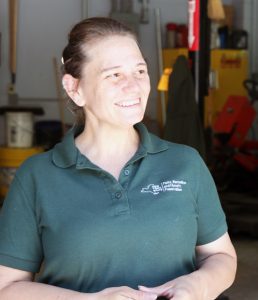
Margie Cosimeno is a second-generation park worker at Verona Beach State Park. Since she was 5 years old she’s been coming to Verona Beach and now she supervises the crews that take care of the park and beach.
For Margie Cosimeno, a supervisor at Verona Beach State Park, working in the parks system is in the family. Both of her parents worked at Verona Beach and she’s been coming to the park since she was 5 years old.
“You come in (to the park) and you want it to represent you, so we’re out there all the time trying to make something good for people and make them happy,” Cosimeno said. “We’re here to service the public. I got a great crew that works maintenance, and not only is it not just a job to them, it’s a part of them. Working at this park, they have a lot of pride in what they do and they go the distance.”
“State parks employees are essential,” said Fayol. “We always do what we need to do to get the job done. When New York was on pause, we were here for New York.”
— Jessica Ladlee, Wendi Bowie, Ove Overmyer and Nicholas Newcomb
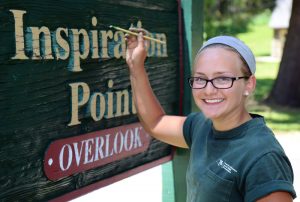
Allison Karasiewicz paints a sign at Letchworth State Park.
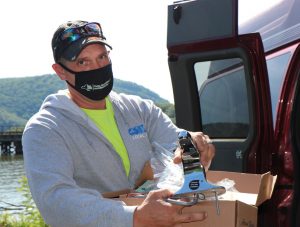
CSEA member Brock Morrison, a trades specialist plumber and steamfitter based at Bear Mountain State Park, shows off one of the hundreds of automated faucets he’s installed in bathrooms at state parks and historic sites in the Palisades Parks Region in response to the COVID-19 pandemic.

